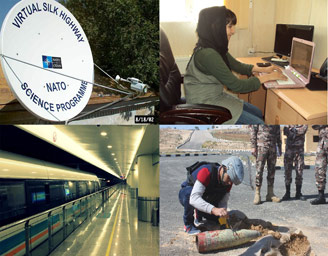1958 - 2018: The Science for Peace and Security Programme celebrates its 60th anniversary
2018 marks the 60th anniversary of the NATO Science for Peace and Security (SPS) Programme, the foundations of which were laid on 13 December 1956, when the North Atlantic Council endorsed a report to enhance non-military cooperation and coordination within NATO in line with Articles 2 and 4 of the North Atlantic Treaty. Known as the Report of the Three Wise Men, it proposed concrete activities to enhance cooperation in the areas of politics, economics and science. The final Report of three NATO Ministers, i.e. Lester B. Pearson (Foreign Minister of Canada), Gaetano Martino (Foreign Minister of Italy), and Halvard Lange (Foreign Minister of Norway), included a dedicated subchapter on scientific and technological cooperation.

The NATO Science Programme was launched in direct response to the Three Wise Men’s recommendations in 1957 and against the background of the launch of Sputnik I, which showed the gap between Soviet and Allied missile technology. The Programme was aimed at promoting scientific projects and collaboration among scientists from NATO countries to facilitate exchange and maximise the return on research investments. One year later, the first Science Advisor to the Secretary General was appointed and the NATO Science Committee (SCOM) met for the first time on 29 March 1958. The NATO Science Committee was composed of member country representatives who were “qualified to speak authoritatively on scientific policy” and provided recommendations to the North Atlantic Council. It aimed to promote scientific cooperation for Allied security, strengthen the transatlantic link, and enhance solidarity.
During the period of détente in the 1960s, Allies grew increasingly conscious of common environmental problem that could threaten the welfare and progress of their societies. Accordingly, the North Atlantic Council created the Committee on the Challenges of Modern Society (CCMS) in 1969. The CCMS was subsequently expanded to include partners, and provided a unique platform for the sharing of knowledge and experience on technical, scientific, and policy aspects of social and environmental matter in both the civilian and military sectors.
In 1992, following the political changes in Central and Eastern Europe and the Soviet Union, the geographical scope of the activities of the Science Committee and the CCMS grew substantially with the creation of the North Atlantic Cooperation Council (NACC). The NACC eventually became the Euro-Atlantic Partnership Council, which provided a forum for dialogue and consultation on political and security-related issues, and for partnership through practical cooperation activities.
In 2003, the Science Committee and its Programme were transferred to the newly created NATO Public Diplomacy Division. This development represented a fundamental re-direction of the Science Programme to focus on security, in line with NATO’s new directions and objectives. It is only in 2006 that the restructured Programme took its current name of the Science for Peace and Security, following the merger of the Science Committee and CCMS. Soon after, in 2010 the SPS Programme and its staff were embedded into the Emerging Security Challenges (ESC) Division that was created in the same year. Corresponding to this move, the SPS Key Priorities were updated in 2012 to reflect an increased focus on new security challenges such as cyber defence, terrorism, and energy security.
As this brief historical account demonstrates, NATO’s civil science programme has been flexible and adapted throughout its 60-year history to reflect and respond to the changing political and security context in which it operates. In the early years, the Science Programme contributed to building a positive image of NATO as a security provider through engagement with Allied scientific and civilian communities based on the principles of solidarity. Over the years, and particularly at the end of the Cold War, this intra-alliance programme was transformed to reach out to and offer practical cooperation across NATO’s partnership frameworks. Since the Programme’s inception, a wide international network of scientist and experts from NATO member and partner countries has been established. More than 20 Nobel Laureates are associated with the SPS Programme, a testament to the scientific excellence supported by the SPS Programme.

Today, the SPS Programme provides well-established and globally recognized mechanisms to engage all partners in practical cooperation activities based on scientific research, technological innovation, and knowledge exchange. SPS offers funding, expert advice and support to tailor-made, security-related activities that respond to NATO’s strategic objectives and address priority areas of cooperation as with partners.
Highlights – SPS Programme’s Key Flagship Activities
Over the past decade, the Programme has initiated nearly 800 collaborative activities among its 29 member states and 41 partner countries ranging from cyber defence in Jordan to humanitarian demining in Ukraine. SPS Programme’s key flagship activities from the past decade include the following:
- Provision of high-speed internet connectivity to Afghan universities and government institutions through the SILK-Afghanistan programme
- Conversion of the toxic rocket fuel oxidizer into fertilizer in Azerbaijan and Uzbekistan
- Installation of a multinational telemedicine system for remote medical expert response during emergency situations
- Enhancement of regional cooperation through a Caucasus Seismic Emergency Response Programme
- Establishment of a National System of Crisis Management Coordination in Mauritania, serving as a model for the wider Sahel region
- Development of advanced detection systems for demining and unexploded ordnance clearance in Egypt
- Provision of tailor-made support to the Comprehensive Assistance Package for Ukraine
- Contributions to the Defence and Related Security Capacity Building Initiatives for Iraq, Jordan and the Republic of Moldova
- Establishment of a Next Generation Incident Command System (NICS) in the Western Balkans
- A follow-on consortium of real time explosive detection systems for public transportation
- A package of tailor-made SPS training courses in the areas of CRBN defence, energy security, and cyber defence for all ICI countries, in partnership with the NATO-ICI Regional Centre in Kuwait
